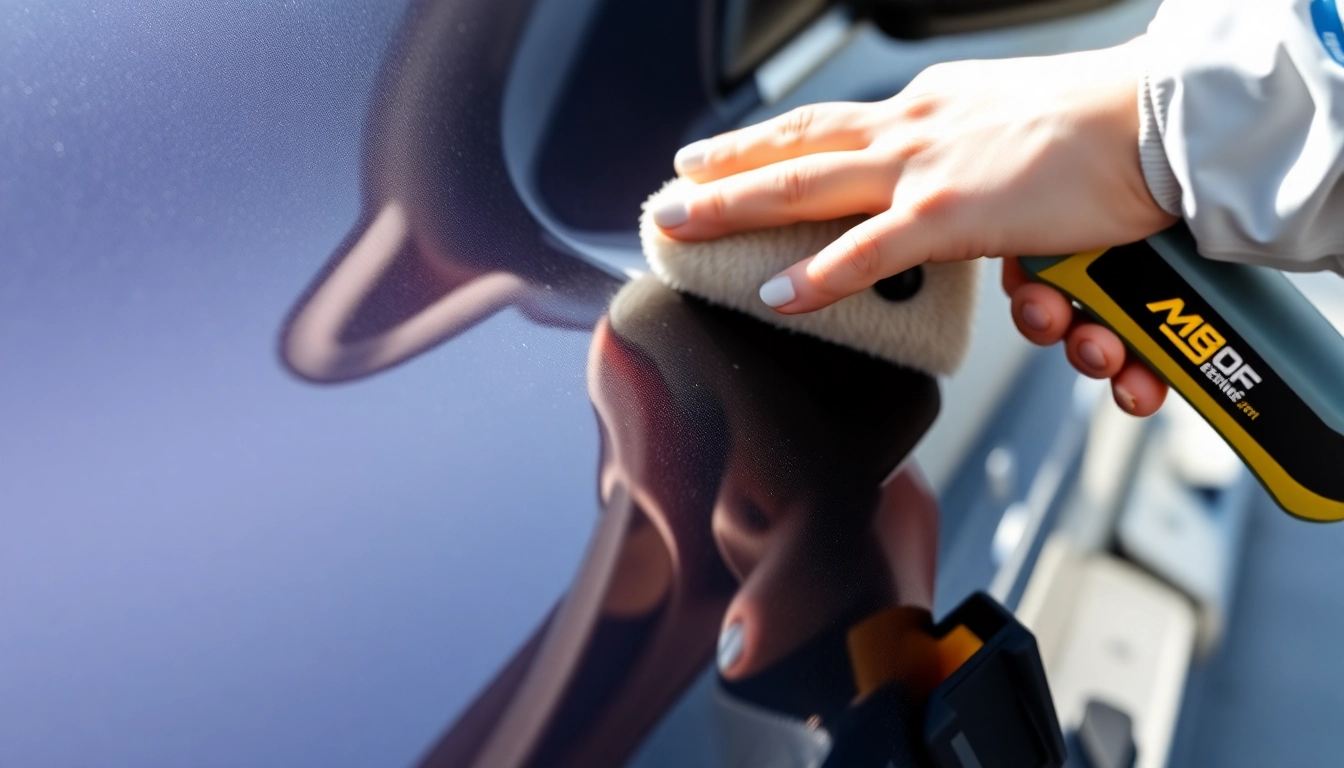Introduction: The Importance of Proper Wohnmobil Polishing Sealant
Maintaining the pristine appearance and integrity of your Wohnmobil (motorhome) requires more than regular washing; it demands the application of specialized protective coatings that ensure long-lasting shine and defense against environmental elements. One of the most effective ways to safeguard your investment is through Wohnmobil Politursiegelung. This process not only enhances the visual appeal but also shields your vehicle from water, dirt, UV rays, and other damaging factors. In this comprehensive guide, we delve into the essentials of Wohnmobil polishing sealant, exploring its benefits, application techniques, and the latest innovations to help you achieve professional-grade results at home.
Understanding Wohnmobil Polishing Sealant: What It Is and Why It Matters
Wohnmobil polishing sealant is a protective coating designed to create a durable barrier on the surface of your vehicle, typically on painted, gelcoat, or GFK (glass-fiber reinforced plastic) surfaces. Unlike routine waxes or fast coatings, high-quality sealants, especially those based on ceramic technology, offer extended protection, often lasting several years. They help maintain the high-gloss finish, prevent minor scratches, and facilitate easier cleaning in subsequent washes.
According to industry experts, choosing the right sealant depends on various factors, including your vehicle’s material, usage environment, and desired longevity. Leading brands like SONAX and CLEANOFANT provide advanced formulations that deliver exceptional water-beading properties as well as resistance to UV rays and contaminants. By opting for a professional-grade product, you ensure your Wohnmobil remains in top condition for years to come.
Advantages of Wohnmobil Politursiegelung
- Enhanced Protection: Sealants form an impenetrable barrier against water spots, dirt, and environmental pollutants, significantly reducing the frequency of washing required.
- Long-Lasting Shine: They provide a deep, mirror-like gloss that enhances the vehicle’s appearance, making color and finish appear vibrant and freshly polished longer.
- Ease of Maintenance: Surfaces coated with sealants repel dirt and water, simplifying cleaning processes and reducing abrasive wear.
- Damage Prevention: Protecting against minor scratches, swirl marks, and UV-induced fading helps preserve the underlying paint and gelcoat surfaces.
- Cost-Effective in Long Term: While initial application might require investment, the extended durability translates into savings on maintenance and reapplication costs over time.
Recent studies indicate that properly applied ceramic sealants can extend the interval between washes and polishings by up to 50%, saving both time and money for dedicated Wohnmobil owners.
Types and Technologies of Wohnmobil Politursiegelung
Chemical-Based Sealants
Conventional sealants are typically composed of polymer resins that bond with the surface to provide a protective layer. These include synthetic waxes and polymer blends that offer moderate durability and ease of application. They are ideal for enthusiasts seeking a quick, cost-effective protective solution with decent longevity.
Ceramic Coatings
Ceramic sealants, such as SiO2-based products, represent the latest evolution in vehicle protection technology. They form a semi-permanent, chemically bonded layer that provides superior hydrophobicity and resistance. These coatings are highly durable, often lasting 2-5 years, and are resistant to chemicals, UV rays, and abrasion, making them especially suitable for outdoor Wohnmobils exposed to varying weather conditions.
Nanotechnology-Enhanced Sealants
Advanced formulations incorporate nanotechnology, which allows for micro-structured layers that penetrate microscopic surface imperfections. This results in better adhesion, increased surface hardness, and long-term water repellency, offering a professional-level finish even for DIY enthusiasts.
Common Challenges in Applying Wohnmobil Politursiegelung and How to Overcome Them
Surface Preparation
Ensuring a clean, smooth surface is critical. Dirt, old wax, and contaminants hinder proper adhesion. Proper cleaning with dedicated wash products such as BCC Power Cleaner combined with decontamination steps—including clay bar treatment—are essential before applying the sealant.
Application Errors
Uneven layer, streaks, or missing spots occur due to improper technique or environmental factors. Applying in controlled conditions—shade, moderate temperature, and low humidity—along with using the right applicator tools, helps mitigate such issues.
Incorrect Curing Conditions
Sealants require specific curing times and conditions to bond optimally. Avoid applying during rain or in direct sunlight. Follow manufacturer instructions carefully regarding drying and curing times to ensure maximum adhesion and durability.
Step-by-Step: Achieving a Perfect Wohnmobil Politursiegelung
1. Thorough Cleaning and Inspection
Start by washing the Wohnmobil with a high-quality vehicle cleaner like BCC Power Cleaner 1L. Use dedicated tools such as the BCC All Stars Plus Waschbürste or microfiber towels to remove dirt, grime, and old wax. Inspect the surface for scratches or imperfections that might require polishing prior to sealing.
2. Correct Surface Preparation
Decontaminate with clay bars if necessary, then remove any residual contaminants. For surface imperfections, perform correction with appropriate polishing tools—such as BCC Polierpuck extra weich or Polierschwämme Medium—using a mild polishing paste like BCC Power Polish.
3. Selecting the Right Sealant
Choose a sealant aligned with your needs—ceramic coatings for long-term protection or synthetic sealants for convenience. For ultimate durability, consider products like BCC Power Sealer or high-quality ceramic sprays such as SONAX XTREME Ceramic Spray.
4. Application and Tinning
Apply the sealant evenly using an applicator pad or microfiber cloth, working in small sections to avoid rapid drying. Allow the product to cure as per manufacturer instructions, usually 15-30 minutes, and then buff with a clean microfiber towel.
5. Final Inspection and Curing
Inspect for streaks or uneven spots. Once fully cured, your Wohnmobil surface will exhibit a deep, glossy finish with optimal water repellency.
Best Practices for Longevity and Peak Performance
Post-application Care
After sealing, avoid washing the vehicle with abrasive cleaners or brushes. Use gentle, pH-neutral shampoos and microfiber towels. Periodically reapply a spray sealant or refresh the existing coating with a ceramic booster spray to maintain maximum protection.
Scheduled Maintenance
Depending on exposure and sealant type, re-apply every 1-3 years. Regular inspections and maintaining clean surfaces will significantly extend the lifespan of your protection layer.
Common Mistakes to Avoid
Applying in unsuitable weather, using low-quality applicators, or neglecting thorough surface preparation can compromise results. Follow detailed instructions and invest in professional tools, such as the BCC Towels Vorteilspack, for superior application and finish.
Innovative Products and Emerging Techniques in Wohnmobil Protection
Top-Performing Products for Professional-Level Sealant
Leaders like BCC Power Sealer and top ceramic products exemplify the latest innovations. Combining these with auxiliary tools like the GLORIA FoamMaster FoamSpray and high-quality microfiber towels result in an efficient, professional-grade coating process.
Ceramic vs. Conventional Sealants: A Comparative Overview
Ceramic coatings provide significantly longer-lasting protection and superior hydrophobicity compared to traditional synthetic sealants. While they might require more meticulous application, their durability and performance justify the investment, making them the preferred choice for serious Wohnmobil owners.
Future Trends in Wohnmobil Surface Care
Advances in nanotechnology and smart coatings aim to develop entirely self-healing surfaces, environmentally friendly formulas, and self-cleaning capabilities. Staying informed about ongoing innovations will enable you to choose products that maximize protection and minimize maintenance efforts.
Assessing Performance and Optimizing Results
Monitoring Service Intervals and Protective Efficacy
Regularly inspect your coated surfaces for signs of wear or water behavior—such as reduced beading. Use water droplets to test hydrophobicity; larger droplets indicate better protection.
Collecting Feedback and Enhancing Application Techniques
Gather insights from reviews and community feedback to refine your application processes. Professional forums and user testimonials can reveal practical tips, such as optimal environmental conditions or tool selections.
Improving Results Through Data-Driven Approaches
Maintain detailed records of application dates, products used, and environmental conditions. Analyze patterns over time to determine the most effective routines, ensuring your Wohnmobil retains its shine and protection longer.



